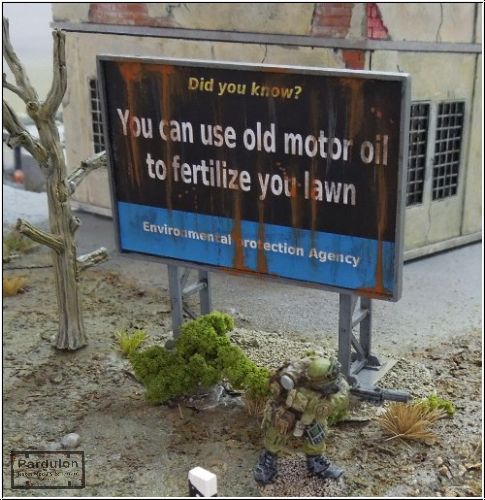Imagine transforming your lawn into a lush green paradise without spending a fortune on commercial fertilizers. You might have heard whispers or seen discussions online about using old motor oil as a secret ingredient for lawn care.
But is this really possible, or is it just a dangerous myth waiting to backfire? You care about your lawn and want to make the best choices for its health and beauty. This article will unravel the truth behind using old motor oil as a fertilizer.
Dive in to discover whether this unconventional method is a hidden gem or a risky gamble. Your lawn’s future might just depend on what you learn next.

Credit: www.beastsofwar.com
Motor Oil Composition
Old motor oil contains harmful chemicals. These can damage plants and soil if used as fertilizer. Proper disposal is necessary.
Motor oil is a crucial component for keeping our vehicles running smoothly, but have you ever wondered what it’s made of? Understanding the composition of motor oil can help you grasp why it might not be the best choice for fertilizing your lawn. Let’s dive into the specific ingredients and properties of motor oil to uncover its potential effects on the environment and your greenery.Chemical Properties
Motor oil is a complex blend of base oils and various additives. These base oils are typically derived from refined crude oil or synthesized chemical compounds. Additives enhance the oil’s performance by providing detergents, dispersants, and other properties to protect engine parts. While these components are excellent for your car, they can be harmful to the soil and plants. The chemicals in motor oil can be toxic to microorganisms in the soil, which are essential for plant health. Consider this: would you want to add something to your lawn that could disrupt its natural balance?Potential Environmental Impact
Using old motor oil on your lawn can have significant environmental consequences. When oil seeps into the soil, it can contaminate groundwater, which affects not just your lawn but the entire ecosystem. This contamination can harm plants, wildlife, and even human health. Think about the long-term effects. The damage caused by improper disposal of motor oil can take years to rectify, if at all. Is it worth risking the health of your lawn and the surrounding environment? It’s essential to consider environmentally friendly alternatives for fertilizing your lawn. Options like compost or organic fertilizers provide nutrients without the potential for harmful side effects. Why not choose a method that enriches your lawn and supports the planet?
Credit: www.reddit.com
Common Misconceptions
Many people believe old motor oil can help fertilize lawns. This belief arises from several misconceptions that have persisted over time. Using motor oil on grass is not a safe or effective practice. Understanding these misconceptions can prevent harm to your lawn and the environment.
Historical Practices
Years ago, some gardeners used motor oil in gardens. They thought it could enrich the soil. This practice was based on little scientific evidence. People didn’t understand the environmental impact back then. Today, we know better. Motor oil contains chemicals harmful to plants and soil.
Myths And Misinformation
Some myths suggest motor oil repels pests. This is not true. It can actually kill beneficial soil organisms. Another myth claims it improves soil texture. In reality, it can make soil toxic. Motor oil is not a safe fertilizer for lawns. It poses risks to the ecosystem.
Effects On Soil Health
Using old motor oil as a lawn fertilizer may seem tempting. But it poses significant risks to soil health. This practice can lead to severe environmental issues. Understanding these effects is crucial for responsible lawn care.
Soil Contamination
Old motor oil can introduce harmful chemicals into the soil. These chemicals include heavy metals and toxic compounds. Once in the soil, they can persist for years. This contamination affects soil quality and plant health. Microorganisms in the soil may die off. This disrupts the natural balance necessary for plant growth.
Impact On Nutrient Balance
The presence of motor oil in soil can hinder nutrient absorption. Plants rely on a balanced nutrient mix for growth. Oil residues can block roots from accessing these nutrients. This leads to stunted growth and poor plant health. The soil’s natural ability to support life diminishes. This makes it hard for plants to thrive.
Impact On Plant Growth
Old motor oil harms plant growth and soil health. Chemicals in the oil can kill grass and other plants. Avoid using it as a lawn fertilizer to protect your garden.
When considering ways to enrich your lawn, using old motor oil might seem like a cost-effective solution. However, it’s crucial to understand its potential impact on plant growth. While you might be tempted by the idea of recycling, this approach might not be as green as it sounds. Let’s delve into how motor oil can affect your garden and what signs to watch for.Toxicity Risks
Motor oil contains harmful chemicals that can be toxic to plants. These substances can seep into the soil, affecting the roots and ultimately hindering plant growth. If you’ve ever accidentally spilled oil on your driveway, you might have noticed how nothing grows in that spot for ages. This is a clear sign of oil’s toxicity. The risk doesn’t stop at plants. The toxic compounds can leach into groundwater, potentially affecting your entire garden ecosystem. If you’re keen on maintaining a healthy lawn, it’s essential to avoid introducing such hazardous materials.Signs Of Damage
Wondering if your plants are suffering from oil exposure? Look for stunted growth, yellowing leaves, or wilting that seems out of place. These are classic indicators of chemical stress. Plants might also show signs of root damage, which can be harder to spot. If your lawn seems patchy or less vibrant, it might be struggling with unseen oil residue. To protect your garden, consider safer alternatives for fertilization. Organic compost or commercial fertilizers designed for lawn care offer healthier choices. What steps will you take to ensure your lawn stays green and vibrant without risking its health?Environmental Concerns
Using old motor oil as lawn fertilizer raises environmental concerns. Motor oil contains harmful chemicals that can damage soil health. Instead, consider environmentally friendly alternatives for lawn care to protect the ecosystem.
When considering what to do with old motor oil, using it as a fertilizer for your lawn might seem like an easy solution. However, this practice raises serious environmental concerns that shouldn’t be overlooked. While it may feel like a quick fix, the impacts on our planet and its delicate ecosystems are profound.Water Runoff Implications
Pouring motor oil onto your lawn can lead to harmful water runoff. When it rains, oil residues can seep into the soil, traveling to nearby water bodies. This contamination can affect the quality of water, making it unsafe for drinking and damaging to aquatic life. You might think your lawn is just a small patch, but every drop of oil adds up. Consider if everyone in your neighborhood did the same. What would that mean for your local rivers and lakes? It’s a ripple effect that starts with a single lawn.Wildlife And Ecosystem Effects
Motor oil contains toxic chemicals that can harm wildlife. Birds and small mammals that come into contact with contaminated areas can suffer from health issues. Even worse, these toxins can move up the food chain, affecting larger animals. Your lawn is part of a bigger ecosystem. Imagine your backyard as a small community where every creature plays a role. Introducing toxins disrupts this balance, leading to unforeseen consequences. Would you want to risk the health of these living creatures? These environmental concerns highlight the importance of responsible disposal. Instead of using motor oil on your lawn, explore eco-friendly alternatives. Many auto shops and recycling centers offer proper disposal options, helping you protect the environment. What choices will you make today to ensure a healthier planet tomorrow?Safe Lawn Care Alternatives
Many people wonder about using old motor oil as a lawn fertilizer. This practice is not safe for your grass or the environment. Instead, consider safe lawn care alternatives that are both effective and eco-friendly. These methods enrich your lawn without causing harm.
Natural Fertilizers
Natural fertilizers are a great choice for healthy lawns. They come from plants, animals, or minerals. Compost is an excellent natural option. It enriches soil with nutrients. Manure from farm animals is another effective choice. It provides nitrogen, phosphorus, and potassium.
Grass clippings also work as a natural fertilizer. Leave them on the lawn after mowing. They decompose and feed your soil. This practice is often called grasscycling. It saves time and reduces waste.
Organic Lawn Maintenance
Organic lawn maintenance involves using natural products. They help keep your lawn healthy without harmful chemicals. Aerating your lawn improves soil health. It allows air, water, and nutrients to reach the roots. This process also reduces soil compaction.
Use natural pest control methods. Introduce beneficial insects like ladybugs. They eat harmful pests and protect your grass. Hand-pulling weeds is another organic method. It keeps your lawn tidy without chemicals.
Regular watering is crucial for a healthy lawn. Water deeply but less frequently. This encourages deeper root growth. Early morning is the best time to water. It reduces evaporation and ensures your lawn stays hydrated.
Proper Disposal Of Motor Oil
Proper disposal of motor oil is crucial for maintaining a healthy environment. Tossing old motor oil in the trash or pouring it down the drain can lead to severe pollution problems. It’s essential to understand how to dispose of motor oil responsibly to protect our water sources and soil.
Recycling Options
Did you know you can recycle motor oil? Many auto shops and service stations accept used oil for recycling. They often have designated containers for collection.
Contact your local waste management facility to see if they offer recycling services. Some communities even organize collection events where you can drop off your oil safely.
Recycling motor oil can prevent contamination and give it a new life. Consider how your small action can contribute to a cleaner environment. Next time you change your oil, think about recycling it instead of discarding it.
Legal Regulations
Are you aware of the legal implications of improperly disposing of motor oil? Many regions have strict regulations in place. Disposing of oil incorrectly can lead to fines or penalties.
Check your local laws to understand the requirements for motor oil disposal. Compliance ensures you’re not inadvertently harming the environment or facing legal consequences.
Knowing the rules can save you trouble and keep your conscience clear. Why risk penalties when proper disposal is straightforward and accessible? Always be informed about your local regulations.
Proper disposal of motor oil is about more than just following rules. It’s about making choices that protect our planet and future generations. Are you ready to make a positive impact? Choose responsible disposal methods and be a part of the solution.

Credit: www.youtube.com
Conclusion
Using old motor oil on your lawn is not safe. It harms the soil and plants. Toxic chemicals in the oil can spread. This affects water, wildlife, and humans. Better options exist for lawn care. Natural fertilizers and proper lawn maintenance work well.
They help your lawn grow healthy and green. Dispose of old motor oil responsibly. Recycle it at designated centers. Protecting the environment is crucial. Choose eco-friendly methods for a beautiful lawn. Simple actions make a big difference. Let’s care for our planet wisely.
